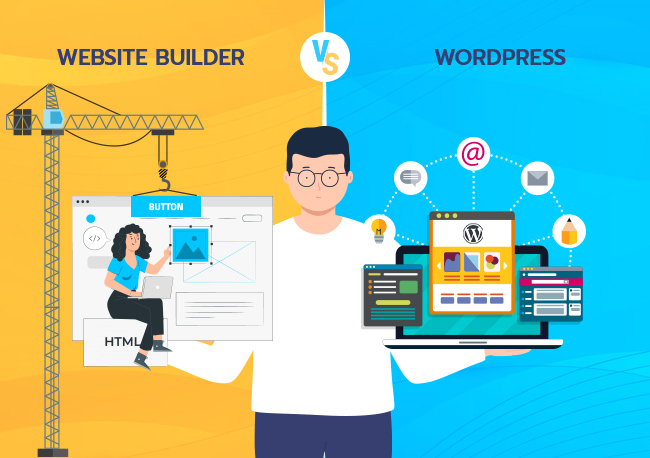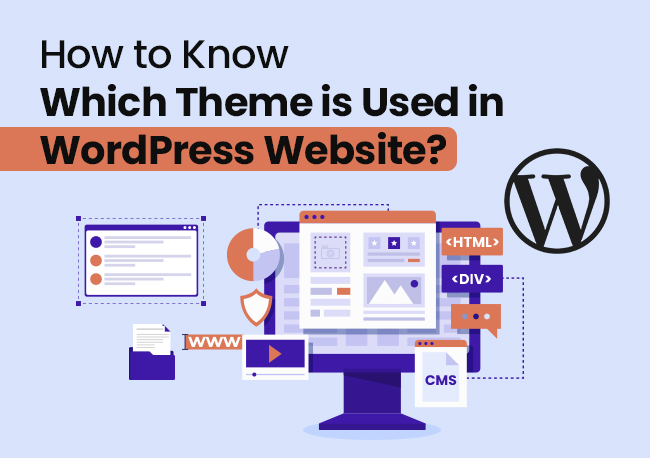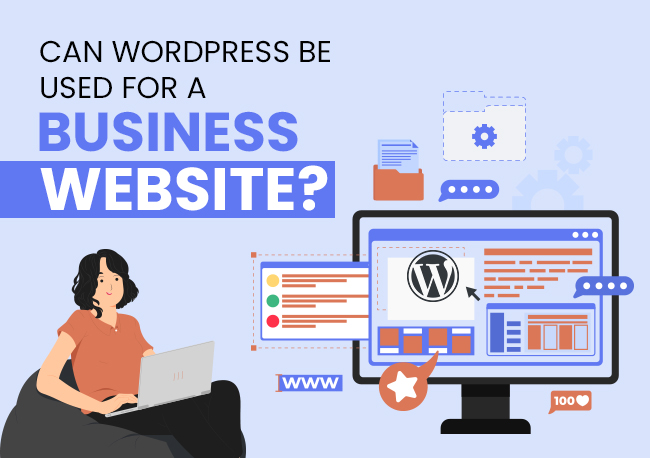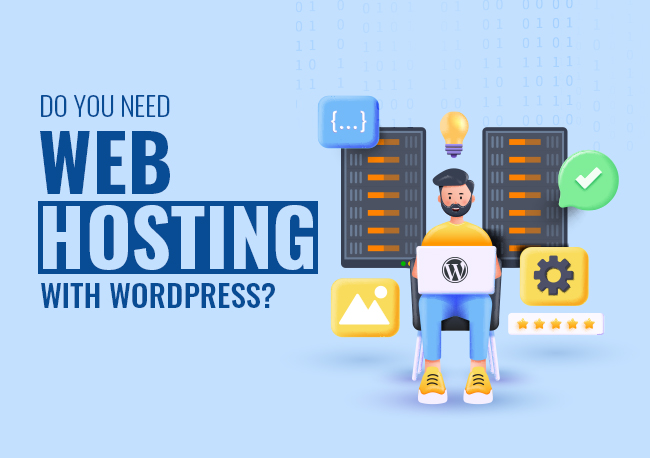When you are creating a website, the most important question that comes to your mind is, “What to use to create a website?” There are so many options and tools to create a website, and then there is WordPress. You can use a Website Builder as well as WordPress to create a website.
Both Website builder and WordPress have their pros and cons. Choosing one of the two depends on you and your needs. It can be difficult to opt between a website builder and WordPress, but again, you should look at the pros and cons and choose according to your needs.
Let’s first understand the basics of the two:
What is a Website Builder?
A website builder is a software that allows users to create and design a website without having any coding or web development knowledge. Their drag-and-drop interface makes it easy for users to add text, images, and other elements to their website.
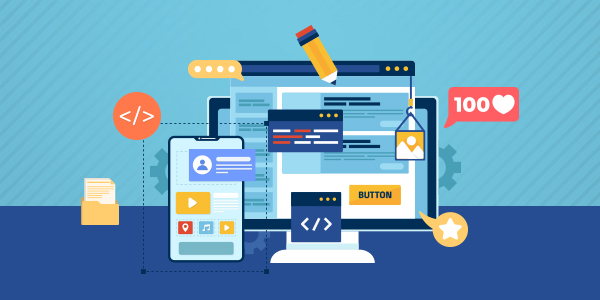
Website Builders typically are a one-stop-shop for creating a website as they often include hosting and domain registration as part of their package. However, some website builders may not include them in their packages.
Website builders are cost-effective, as many offer free plans or low-cost subscriptions, making them a great option for small businesses, start-ups, and individuals.
You don’t need to start from scratch while creating a website on Website Builders, as they come with pre-made templates designed by professional designers and optimized to suit different industries and niches.
Also Read: Website Development Checklist To Help Create Your First Website
➢ Pros of Website Builder
★ Easy to Use: Simple, intuitive, and straightforward drag-and-drop interface, making it easy for anyone to create a website, regardless of their technical skills. Allows users to easily add or move elements around the page, change the layout, and add new pages to your website.
★ Inexpensive: Many website builders offer free plans or low-cost subscriptions, making it cost-effective. A great option for individuals, start-ups, and small businesses. Some website builders also offer additional services like hosting, e-commerce integration, and SEO optimization, making it an inexpensive option with so many tools.
★ Design Templates: Professionally designed and optimized pre-made templates make it easy for users to create a website. Saves you lots of time and effort.
★ All-in-one solution: Website builders often include hosting, domain registration, and other features in one package, making it a one-stop shop for creating websites.
★ Built-in SEO features: Website builders also have built-in SEO features, such as title tags, meta descriptions, header tags, and analytics tools, that help improve your website’s visibility in search engine results.
Also Read: A Complete SEO Strategy Guide For New Websites
➢ Cons of Website Builder
➔ Limited Customization: While they are easy to use, website builders don’t offer a lot of customizability. If you wish to create a unique and custom website that stands out from the competition, you may not select website builders as they offer limited customization options.
➔ Limited Scalability: Website builders are unsuitable for large or complex websites. Website builders are mainly designed for small and simple websites; they may not be able to handle the complexity and functionality of large websites.
Additionally, if your website receives a high traffic volume, a website builder may not be able to handle it, and your website may experience performance issues.
➔ Less Control over the website: Website builders often have limitations on how much control you have over your website. You may be unable to access certain features or make certain changes to your website.
➔ Limited SEO optimization: While website builders include some basic SEO features, but they may not offer the same level of customization and flexibility as a standalone SEO tool.
What is WordPress?
WordPress is a popular content management system (CMS) that allows users to create and manage websites. Initially released in 2003 as a blogging platform, it has since evolved into a powerful CMS that can be used to create all types of websites.
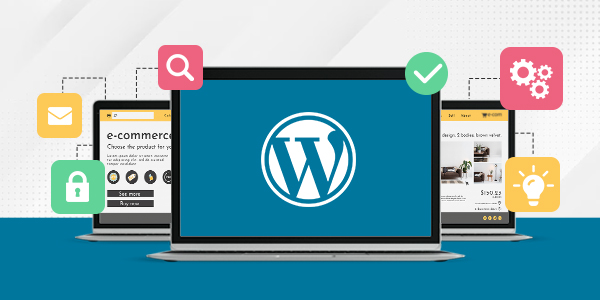
WordPress is based on PHP and MySQL. It is open-source software that is free to use and can be modified by anyone. The source code of WordPress is available for anyone to download, use, and modify.
WordPress is a powerful and versatile content management system that allows users to create and manage websites. It is supported by a large community of developers and users responsible for creating a wide range of themes and best plugins that can be used to customize and enhance the functionality of your website.
Also Read: 11 Benefits Of WordPress Development For Your Website
➢ Pros of WordPress
★ Highly Customizable: WordPress is highly customizable; it includes thousands of themes and plugins you can use to tailor your website to your needs. It allows you to tailor a unique, custom website that stands out from the competition.
Moreover, if you have coding knowledge, you can even alter the code of your website to customize it according to your needs.
★ Scalable: WordPress is suitable for small as well as large websites, and it is easy to add new features and functionality as your website grows. WordPress can handle high traffic and a large number of pages.
★ Highly SEO-Friendly: WordPress is optimized for search engines and also provides many SEO-related features that you can use to optimize your website, including title tags, meta descriptions, header tags, and analytics tools. The clean and organized code structure of WordPress makes it easy for crawlers to crawl your website efficiently. You can also add SEO plugins to Optimize search engines.
★ Wide range of Features and Functionalities: WordPress offers a wide range of features and functionalities that can be added to your website using plugins, including e-commerce integration, social media integration, etc.
➢ Cons of WordPress
➔ Not as easy to use: WordPress is not as easy-to-use as website builders. To fully utilize WordPress, you need t have some coding knowledge.
➔ No Hosting and Domain Registration: Unlike website builders, there is no Hosting and Domain Registration.
Also Read: Do You Need Web Hosting With WordPress?
➔ Security: It is up to the user to keep the WordPress software and all the installed themes and plugins updated to work properly and are secure. Since it is open-source software, the community of developers keeps updating and fixing the vulnerabilities.
To be secure, you as a user must keep your software, themes, and plugins updated.
Also Read: Best WordPress Security Plugins In 2023 (Paid+Free)
Is WordPress a Website Builder?
While WordPress shares some similarities with Website Builders, it differs in several ways. WordPress is an open-source platform with a wide range of customization options and scalability, making it a more powerful and flexible website creation option. WordPress is a content management system (CMS) that allows one to create and manage websites.
Website Builder vs WordPress
➢ Website builder’s pre-made templates can be customized to a certain extent, whereas WordPress is highly customizable, with thousands of themes and plugins that can be used to customize the website to your needs. Website builder’s pre-made templates can be customized to a certain extent, whereas WordPress is highly customizable, with thousands of themes and plugins that can be used to customize the website to your needs.
➢ Website builders have limitations on how much control you have over your website, whereas WordPress gives you more control over your website; you have control over the source code, and you can make advanced customizations.
➢ Website builders usually have limited hosting options, whereas WordPress can be hosted on various hosting platforms.
➢ Website builders are designed for small websites; therefore, they are inefficient in handling large and complex websites, whereas WordPress can handle large traffic and is suitable for both small and large websites.
➢ Website builders usually offer more technical support than WordPress. WordPress, as open-source software, doesn’t have a central authority responsible for providing technical support.
Also Read: Web Hosting VS Website Builder – Know The Difference.
When Should You Use a Website Builder?
Website Builder is a great option if you want to create a simple, professional-looking website that doesn’t require advanced features or functionality. You can go for a website builder if you don’t have technical skills, time, or resources. It is a great option for small businesses, start-ups, and individuals.
When Should You Use WordPress?
WordPress is a great option if you want more control and flexibility over the design and functionality of your website. It is a great option if you want to create large websites with complex functionality and features. WordPress is an ideal choice for e-commerce websites, blogging websites, Portfolio websites, & many other types of websites. It can handle high traffic and is highly scalable. It is a good option for large and complex websites.
What’s Best For SEO?
WordPress generally has more built-in SEO features and a wider range of SEO-related plugins and tools. Moreover, it is designed with SEO in mind, which makes WordPress a clear winner from an SEO point of view.
But remember that content is king and the most important factor in SEO.
Also Read: 15 Best SEO Audit Tools For Your Website (Free+Paid)
What’s Better For YOU?
WordPress is generally considered to be more user-friendly for users who are familiar with website development. In contrast, Website builders are typically more user-friendly for users who are beginners with little to no knowledge of website development.
So it completely depends on your technical knowledge about which option is better for you. If you have less technical knowledge, Website builders are better for you, and if you have good technical knowledge, you can easily go for WordPress.
While there are some website builders with built-in SEO features, such as HubSpot’s, WordPress generally has more built-in SEO features and a wider range of SEO-related plugins and tools. Moreover, it is designed with SEO in mind, which makes WordPress a clear winner from an SEO point of view.
But remember that content is king and the most important factor in SEO.
Recap
In this article, we have discussed every aspect of Website Builders and WordPress. From What they are, their pros and cons, to what’s better for SEO and you.
We hope we’ve answered your question satisfactorily.
Keep Learning and Growing.
